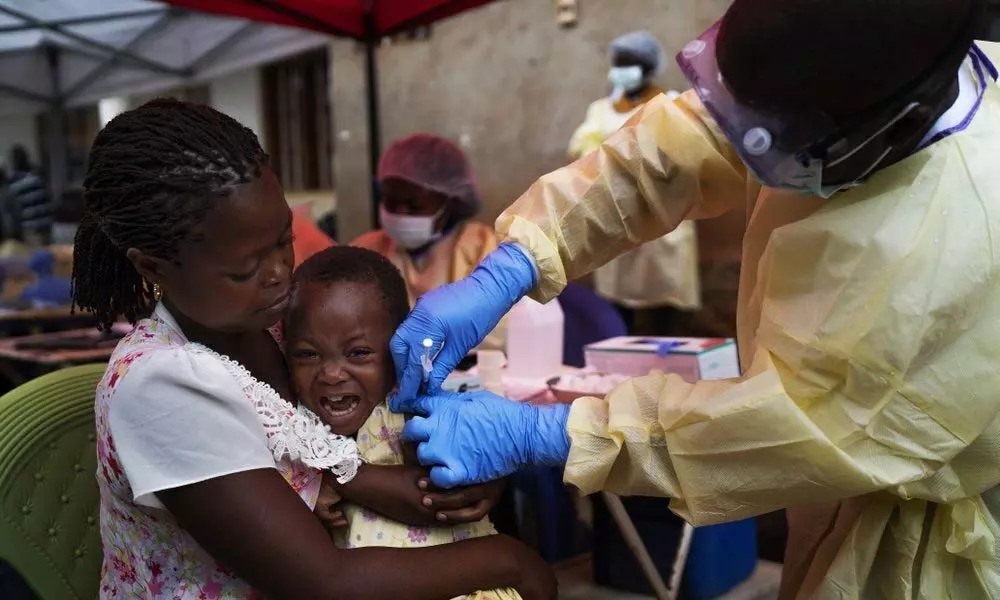Live
- India, Pak in same group; to clash on Feb 23 in Dubai
- India, Pak in same group; to clash on Feb 23 in Dubai
- Kareena reveals her favourite Shyam Benegal film featuring sister Karisma
- A day with Collector Jeebanananda Mohanty
- Odisha signs pact to operate hydrogen-powered bus
- I am a victim of chit fund scam too: Majhi
- Telangana’s Ganapathi Self-Help Group Emerges Winner at PepsiCo India’s RevolutioNari Awards 2024
- Karnataka State real estate body faces problems over fine collection from builders
- ‘Mother India’ Shefali Shah goes river rafting in Rishikesh
- Hotlines meant for cybercrimes not going through in Bengaluru
Just In
WHO announces that the second experimental Ebola vaccine will be used in Congo


The World Health Organization on Monday announced Congo will start using a second experimental Ebola vaccine, as efforts to stop the deadly outbreak are stalled and Doctors Without Borders criticizes vaccination efforts to date.
LONDON: The World Health Organization on Monday announced Congo will start using a second experimental Ebola vaccine, as efforts to stop the deadly outbreak are stalled and Doctors Without Borders criticizes vaccination efforts to date.
Since this outbreak was declared on August 2018, more than 200,000 people have received doses of a vaccine made by Merck which will continue to be used in Congo. The U.N. health agency in a statement said the second vaccine, made by Johnson & Johnson, will be used from October in areas where Ebola is not actively spreading.
Using the Johnson & Johnson vaccine "will ensure that we have potentially an additional tool to prevent the expansion of the outbreak," said Matshidiso Moeti, WHO's Africa director.
So far, more than 3,030 people have been sickened by the Ebola virus in this outbreak, the second-worst in history, and more than 1,990 have died.
The question of whether the Johnson & Johnson experimental vaccine should be used was at the centre of a dispute between Congo's former health minister, Dr. Oly Ilunga and global health officials. Ilunga had insisted Congo would not use the vaccine because he said it wasn't sufficiently tested and would create confusion.
He resigned as the health minister in July after the president replaced him as the head of Congo's Ebola response team. In his resignation letter, Ilunga criticized the "strong pressure exercised in recent months" to use the Johnson & Johnson vaccine.
Separately, Doctors Without Borders is seeking an independent committee to oversee Ebola vaccination efforts, similar to those that have been formed internationally to respond to outbreaks of meningitis, yellow fever and cholera.
The medical charity said greater transparency is needed and alleged that WHO is "restricting the availability" of the Merck vaccine in the field. Doctors Without Borders, also known by its French acronym, MSF, said the approximately 225,000 people vaccinated so far is "largely insufficient" and that between 450,000 and 600,000 people should have been immunized by now.
"Not enough people are getting the vaccine because of some arbitrary rules that haven't been made clear," Dr. Natalie Roberts, emergency coordinator for MSF, told The Associated Press.
She said restricting the vaccine to people who are known contacts of Ebola cases is problematic. "It comes down to very local control when every morning it's someone from WHO who decides who is going to be vaccinated and how many vials to open," she said. "Trying to restrict eligibility for a vaccine for a disease that everybody is afraid of is just not going to work."
MSF has described WHO's a strategy as "like giving firefighters a bucket of water to put out a fire, but only allowing them to use one cup of water a day."
There was no immediate response by WHO to a request for comment on the MSF statement.
Roberts said the number of people vaccinated so far is ultimately a damning assessment of response efforts.
"If you had said at the beginning of the outbreak that we were going to vaccinate this many people, you would assume the outbreak would be over by now," she said. "But clearly the right people were not vaccinated."

© 2024 Hyderabad Media House Limited/The Hans India. All rights reserved. Powered by hocalwire.com






